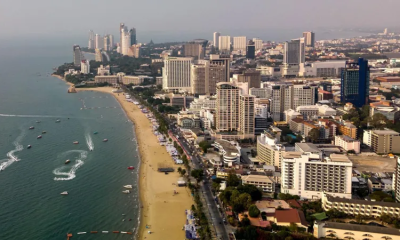Business
DFCC Bank forges ahead amidst a challenging environment

Financial Results for the year ended 31 December 2021
DFCC Group recorded a PAT of LKR 3.7 Bn.
Advances grew by LKR 64 Bn to LKR 366 Bn (21% growth)
Deposits grew by LKR 10 Bn to LKR 320 Bn (3% growth)
The DFCC Group comprises of DFCC Bank PLC (DFCC), and its subsidiaries – Lanka Industrial Estates Limited (LINDEL), DFCC Consulting (Pvt) Limited (DCPL) and Synapsys Limited (SL), the joint venture company – Acuity Partners (Pvt) Limited (APL) and associate company – National Asset Management Limited (NAMAL).
DFCC Bank PLC, the largest entity within the Group, reported a profit before tax (PBT) of LKR 4,326Mn and a profit after tax (PAT) of LKR 3,222 Mn for the year ended 31 December 2021. This compares with a PBT of LKR 3,398 Mn and a PAT of LKR 2,388 Mn in the year prior.
The Group recorded a PBT of LKR 4,859 Mn and a PAT of LKR 3,665Mn for the year ended 31 December 2021, compared with LKR 3,944 Mn and LKR 2,847 Mn, respectively, in 2020. All the member entities of the Group made positive contributions to this performance.
The basic earnings per ordinary share (EPS) of the Bank improved to LKR 10.14 for the year ended 31 December 2021 from LKR 7.83 for the comparative year 2020, recording an increase of 29%.
The Bank’s Return on Equity (ROE) improved to 6.55% during the year ended 31 December 2021 from 4.93% recorded for the year ended 31 December 2020. The Bank’s Return on Assets (ROA) before tax for the year ended 31 December 2021 is 0.91%, against a figure of0.78% for the year ended 31 December 2020.
Net Interest Income
The Bank recorded LKR 12,653 Mn in net interest income (NII), which is a 15% increase year on year. This contributed to an increase in interest margin from 2.53% in December 2020 to 2.66% in December 2021.
Other Operating Income
Due to travel restrictions imposed during the year to curb the spread of the pandemic, business momentum was noticeably negatively affected.
The Bank staff at Head office and across branch network working continuously over the year has helped the Bank to increase non-funded business. This effort was fruitful as it resulted in an increase in net fee and commission income to LKR 2,596 Mn for the year ended 31 December 2021, up from LKR 2,061 Mn in the comparative year. Other operating income has increased mainly due to increases in dividend income and gains on the sale of fixed income securities during the year ended 31 December 2021.
Impairment Charge on Loans and Other Losses
Impairment provisions for the year ended 31December 2021 was LKR 4,485 Mn compared to LKR 3,298 Mn in the year prior. The NPL ratio increased from 5.56% in December 2020 to 5.60% in December 2021. In order to address the current and potential future impacts of Covid-19 and other prevailing economic conditions on the lending portfolio, the bank has made adequate impairment provisions, as at 31 December 2021, by introducing changes to internal models to cover unseen risk factors in the present highly uncertain and volatile environment, including additional provisions made for the Bank’s exposure to risk elevated sectors.
Operating Expenses
The Bank’s operating expenses increased from LKR 7,387 million during the year prior to LKR 8,381 million during the year under review, primarily due to increases in transport costs, as result of special transport facilities provided to staff due to covid restrictions and non-availability of public transport, along with all other additional expenses incurred in keeping and maintaining a safe and healthy environment within the Bank’s premises, to support client engagements and servicing. During the year, the Bank also created multiple channels to enhance service delivery to customers through a strong digital drive, providing access to uninterrupted banking services during difficult times. This resulted in an increase in IT related expenses in order to support the infrastructure upgrades. However, the numerous process automation and workflow management systems introduced during the year under review helped to facilitate effective cost controls, which resulted in operating expenses being curtailed and managed at these levels.
Other Comprehensive Income
Investments in equity securities and treasury bills and bonds (fixed income securities) are classified as financial assets and their change in fair value is recorded through other comprehensive income. Accordingly, a fair value loss of LKR 36Mn and a net fair value loss of LKR 2,469Mn were recorded on account of equity and fixed income securities, outstanding as at 31 December 2021 respectively. Unfavourable movements in Treasury bill and bond yields resulted in the fair value loss of LKR 4,532 Mn during the year. A gain of LKR 2,062 Mn was recycled through the Income statement by disposing of selected Treasury bill and bond holdings, originally categorized under fair value through other comprehensive income (FVOCI), with the objective of cash flow management to support loans and advance growth in line with projections. The action also goes in tandem with the bank’s expectations with regard to the domestic interest rate trend, going forward.
Business Growth
Despite the challenging business environment, the Bank continued its growth strategy by increasing both its deposit and loan portfolios during the year ended 31 December 2021. The loan portfolio grew by LKR 63,991 Mn to record LKR 365,901 Mn compared to LKR 301,909 Mn as at 31 December 2020, recording an increase of 21%. The Bank’s deposit base also experienced a growth of 3%, recording an increase of LKR 9,834 Mn to LKR 319,861 Mn from LKR 310,027 Mn as at 31 December 2020. This resulted in recording a loan to deposit ratio of 114%. Further CASA ratio improved to 31.25% as at 31 December 2021. Funding costs of the Bank were also contained by using medium to long-term concessionary credit lines. When these concessionary term borrowings are considered, the CASA ratio further improved to 36.47% as at 31 December 2021.
DFCC Bank continued its approach to tap local and foreign currency related long to medium- term borrowing opportunities to facilitate lending to deserving segments of the market whilst maintaining a high-quality portfolio.
Equity and Compliance with Capital Requirements
In order to support future growth as a full-service retail bank, the Bank has consistently maintained a capital ratio above the Basel III minimum capital requirements. As at 31 December 2021, the Bank has recorded Tier 1 and total capital adequacy ratios of 9.31% and 13.03%, respectively which is comfortably above the minimum regulatory requirements of 8% and 12% including capital conservation buffer of 2%. The Bank’s Net Stable Funding Ratio was 122.43%, which is well above the regulatory minimum of 100%.
CEO Comment
“Ensuring that we run our business responsibly, delivering profit with purpose, DFCC Bank will always place our customers at the forefront of everything we do. As a customer centric, digitally enabled bank, we will continue to be a source of stability to our customers and deliver value through an unmatched, top-of-the-line customer experience.
In line with our stated vision, the Bank embarked upon implementing a state of the art, core banking system which went live in October 2021. Considering the magnitude and complexity of the implementation, we have had to face some unforeseen challenge and I take this opportunity to express our sincere thanks and gratitude to all our clients, who have been understanding and patient with us this year, as we continuously strive to ensure a more futuristic, digitally-enabled system for our clients.
Despite the unprecedented challenges faced due to the ongoing pandemic, staff of DFCC Bank have and will continue to work with commitment to combat the negative socio-economic effects that have impacted our customers and assist them through tailor made financial solutions. We will continue to introduce banking services that put safety and security at the forefront and ensure that our internal processes are aligned with these same principles to serve our customers better.
We have a strong asset base to be deployed, but nothing is more important than the loyalty we earn from customers, not just by keeping their money and their data safe, but by offering products and services that meet their financial needs and requirements. This loyalty generates both more predictable returns and keen insights, enabling us to continuously improve our services and exceed customer expectations.”
Business
Shinkansen Moment for Sri Lanka: Raghuraman calls for radical export pivot as Japan backs regional value chain

Sri Lanka must engineer a “Shinkansen effect” in its export strategy or risk being left behind in a rapidly reorganising global economy, warned Indo Lanka Chamber of Commerce and Industry President M. Raghuraman, setting the tone for a high-powered policy dialogue at the Japan–Sri Lanka Business Cooperation forum held on Monday at the JAIC Hilton.
Raghuraman’s call for radical reform came amid a broader push by Japan and Sri Lanka to reposition the island as a strategic node in a regional industrial and logistics corridor linking India, Japan and the wider Global South.
The event, organised by Japan External Trade Organization (JETRO) and the Japan-Sri Lanka Business Co-Operation Committee, brought together policymakers, industry leaders and Japanese investors to map out a new export-led growth model.
“Sri Lanka cannot afford incremental change,” Raghuraman said. “We need a Shinkansen effect — a radical transformation in how we plug into regional and global value chains.”
With India projected to expand its middle-income population from 430 million to over 700 million by 2030, Raghuraman described the subcontinent as a “pot of gold just 22 miles away.” Yet Sri Lanka, he cautioned, has failed to fully capitalise on its proximity, particularly through delayed negotiations on upgrading existing trade arrangements into a more comprehensive economic partnership.
Echoing this regional logic, Toyokazu Nagamune, Regional Representative for South Asia at Japan’s Ministry of Economy, Trade and Industry (METI), framed the corridor within Tokyo’s evolving economic security doctrine.
“With rising geopolitical risks and protectionism, Japan is diversifying supply chains,” Nagamune said.
“It is neither realistic nor cost-efficient to localise entire supply chains within a single country. That is why regional cooperation — especially between India and Sri Lanka — is critical.”
Japan is actively encouraging investment in strategic sectors such as semiconductors, batteries, solar panels and rare earth components in India. But Nagamune stressed that Sri Lanka has complementary strengths — from high-purity rubber to skilled electronics assembly — that can integrate into these value chains.
He cited practical examples: Sri Lanka supplying rubber components for compressors manufactured in India; high-purity silicon inputs for solar cell production; and value-added intermediate goods that enhance cost competitiveness across the corridor.
Secretary to the Ministry of Trade, Commerce, Food Security and Co-Operative Development K.A. Vimalenthirajah acknowledged that policy recalibration is overdue.
“We need to create an enabling environment for manufacturers and shift from merely promoting trading entrepreneurship,” he said. “Sri Lanka must position itself as a preferred destination facilitating both investors and exporters.”
Vimalenthirajah identified three priorities: expanding physical connectivity — including ongoing capacity enhancements at the Colombo Port; strengthening “soft enablers” such as comprehensive free trade agreements and mutual recognition of standards; and institutional reforms including result-oriented single-window systems for trade and investment.
Confidence-building through policy consistency, he added, is paramount to attracting long-term capital.
From the Japanese private sector perspective, Takayuki Himeno, Chief Research Manager at Mitsubishi Research Institute, Inc., underscored that infrastructure alone will not secure Sri Lanka’s ambitions as a logistics hub.
“Sri Lanka’s strategic location is an advantage, but it is no longer enough,” Himeno said. “The challenge is fragmentation. Ports, airports and industries operate in silos. Physical infrastructure must be synchronised with data connectivity.”
Drawing on MRI’s two decades of experience managing Japan’s national single window and customs systems, Himeno pointed to digital integration — including port community systems and streamlined customs processes — as essential to reducing lead times and boosting export competitiveness.
Moderating the discussion, Ruvini Fernando, Head of Financial Advisory at Deloitte Sri Lanka, framed the conversation within Sri Lanka’s urgent need to diversify exports and identify new product lines and markets.
“When Sri Lanka is looking at development through export promotion and new market access, this is a very timely discussion,” she observed.
The strategic thrust emerging from the forum was clear: Sri Lanka’s small domestic market — just over 21 million people — should not be seen as a limitation but as a catalyst to integrate outward into regional production networks.
For Japan, the message is about resilience and cost-competitive diversification. For India, it is about scaling manufacturing depth. For Sri Lanka, it is about moving decisively from raw material exports to value-added components — and from policy inertia to execution.
By Ifham Nizam
Business
CSE hits intra-day high in the wake of US-Iran tensions

CSE closed after its broader index hit an intra-day high of 24,000 yesterday due to tensions in US-Iran relations and a dip in investor sentiment.
The All Share Price Index closed at 0.21 percent, or 49.77 points, at 23,870.07 while the S&P SL20 closed down at 0.28 percent, or 19.19 points, at 6,731.31.
Market turnover was Rs 4.9 billion with six crossings. Some of those crossings were reported in Hayleys, where 500,000 shares crossed to the tune of Rs 120 million; its shares traded at Rs 240, Distilleries 2 million shares crossed to the tune of Rs 119 million; its shares sold at Rs 59.50, Dipped Products 1.4 million shares crossed for Rs 80 million; its shares sold at Rs 57, Dialog Axiata 2.25 million shares crossed to the tune of Rs 73.6 million; its shares sold at Rs 32.70, JKH 2.4 million shares crossed to the tune of Rs 55.4 million, its shares traded at Rs 22.80.
Market was driven by interest across diverse sectors with both heavyweights and penny stocks drawing attention, brokers said.
Top negative contributors to the ASPI were Sampath Bank (down Rs 1.75 at 162.25), Colombo Dockyard (down Rs 4.75 at 156.50), Dialog Axiata (down 0.60 cents at Rs 32.70 ), DFCC Bank (down Rs 2 at 157) and Commercial Bank (down Rs 1 at 233). During the day 276.9 million share volumes changed hands in 39867 transactions.
It is said that top contributors to the turnover were Dialog, JKH, Acme, Renuka Hotels, Colombo Dockyard, People’s Leasing and Finance and Asia Siyaka.
Manufacturing sector,especially JKH, performed well. The telecommunications sector, especially Dialog, also performed well.
Yesterday the rupee was quoted at Rs 309.30/35 to the US dollar in the spot market , improving from Rs 309.35/40 the previous day, dealers said, while bond yields edged up slightly.
The telegraphic transfer rates for the American dollar were 305.9000 buying, 312.9000 selling; the British pound was 411.8379 buying, and 423.2855 selling, and the euro was 358.4993 buying, 370.0205 selling.
By Hiran H Senewiratne
Business
Ceylinco Life wins unrivaled global recognition with 12th straight World Finance award

Stands with world’s best after receiving ‘Best Life Insurer in Sri Lanka’ title in respect of 2025
Ceylinco Life has once again been recognised as the Best Life Insurer in Sri Lanka by World Finance, securing the prestigious international accolade for an unprecedented 12th consecutive year in respect of 2025.The award positions Ceylinco Life among the world’s most respected life insurance companies, placing it in the distinguished company of global winners such as Sun Life (Canada), Acenda (Australia), China Pacific Insurance (China), CNP Assurances (France), The Talanx Group (Germany), Max Life Insurance (India), Nippon Life Insurance Company (Japan), Swiss Life (Switzerland), Aviva (UK) and MassMutual (USA).
Announcing its 2025 Insurance Industry Awards, World Finance said resilience continues to define the global insurance sector, as firms navigate climate-related claims, rising cyber risks and the rapid evolution of digital underwriting. The magazine noted that this year’s winners exemplify a rare balance between innovation and reliability, earning policyholder confidence while redefining responsible insurance in an increasingly digital age.
Commenting on this latest accolade, Ceylinco Life Executive Chairman R. Renganathan said: “Sustaining this level of international recognition over twelve consecutive years reflects the discipline of our operating culture and the clarity of our long-term strategy. Our focus has always been on building a life insurance business that is resilient across cycles, uncompromising on governance, and deeply aligned with the evolving needs of our policyholders and the communities we serve.”
The World Finance award recognises Ceylinco Life as an organisation that consistently demonstrates operational excellence, financial strength and a strong commitment to customer service. Winners are selected following a rigorous assessment of multiple performance indicators, including underwriting efficiency, policy maintenance processes, exposure to risk, customer retention, claims settlement timelines, new customer acquisition and financial stability measured by premium income, market share, life fund growth and profitability.
The judging process is conducted by a panel representing more than 230 years of combined financial and business journalism expertise, supported by a dedicated research team. Reader insight and experience also play a role in nominations, while the panel is required to avoid bias relating to company size or market depth, enabling a fair evaluation across geographies and business models.
World Finance, established in 2007, is a print and online magazine providing comprehensive coverage and analysis of the global financial industry, international business and the world economy. Its awards programmes are designed to identify and recognise the strongest performers in each market through a structured and transparent evaluation process.
Ceylinco Life has been the market leader in Sri Lanka’s life insurance industry for 21 consecutive years, offering innovative insurance solutions that protect and de-risk the ambitions of policyholders. In 2025, the Company was ranked the most valuable insurance brand in Sri Lanka and the 22nd most valuable brand overall by Brand Finance. It was also voted the People’s Life Insurance Service Provider of the Year for the 19th consecutive year in 2025, reaffirming its position as a brand trusted by millions.
The Company has additionally been adjudged Sri Lanka’s Brand of the Year twice within the past five years and has been recognised among the 10 Most Admired Companies in Sri Lanka by the International Chamber of Commerce Sri Lanka (ICCSL) and the Chartered Institute of Management Accountants (CIMA).
-

 Life style6 days ago
Life style6 days agoMarriot new GM Suranga
-

 Business5 days ago
Business5 days agoMinistry of Brands to launch Sri Lanka’s first off-price retail destination
-

 Features6 days ago
Features6 days agoMonks’ march, in America and Sri Lanka
-

 Features6 days ago
Features6 days agoThe Rise of Takaichi
-

 Features6 days ago
Features6 days agoWetlands of Sri Lanka:
-

 News6 days ago
News6 days agoThailand to recruit 10,000 Lankans under new labour pact
-

 News6 days ago
News6 days agoMassive Sangha confab to address alleged injustices against monks
-

 Sports1 day ago
Sports1 day agoOld and new at the SSC, just like Pakistan



















